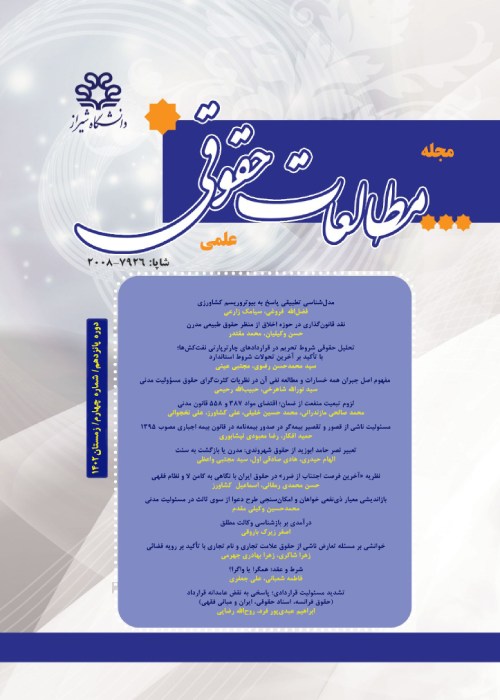The Position of the “Damage” Element in the Civil Liability of the Government
Article Type:
Research/Original Article (دارای رتبه معتبر)
Abstract:
Regarding the pillars of civil liability, in general, many researches and writings have been done, but in the field of civil
Numerous research and writings have been conducted on the pillars of civil liability in general. However, when it comes to the civil liability of the government, due to the diverse activities of government institutions, the complexity and ambiguity of certain topics, and the difficulty of distinguishing the applicable legal regime, challenges still persist to a significant extent. Such a situation calls for greater attention to the distinctive features of government civil responsibility. One crucial question in this regard is: What impact does the element of loss have on other aspects of government civil liability?
This article asserts that the nature of loss, both quantitatively and qualitatively, can, in some cases, play a role in determining the type of fault, establishing the necessity of existence, determining the reference relationship, addressing compensability of damages, establishing the basis of civil liability, and even determining jurisdiction. Using an analytical approach, the findings of this research demonstrate that government civil liability is rooted in the element of fault, considering the various regulations related to attribution. Furthermore, legal exemptions are conditional on the absence of objective damages. In most cases where the government causes harm to individuals, the resulting damage is the consequence of administrative decisions, which cannot directly cause harm. Therefore, such cases should be analyzed in terms of "causation." Moreover, the concept of legal exemptions for the government solely covers non-objective damages or damages resulting from utilization. In other words, the government is only exempted from civil liability when it derives legal benefits from individuals' properties, which necessitates specific provisions in the law and does not grant automatic exemption.
Based on these premises, Article 11 of the Civil Liability Law regarding government sovereign acts can be interpreted as follows: only actions that harm individuals within the scope of the government's legal duties are immune from liability because the law permits such behavior. However, it is worth noting that this legal permission may have been implicitly abrogated by subsequently enacted laws, particularly after the Islamic Revolution's victory.
To explain the aforementioned cases, this article proceeds in two steps. First, it discusses the concept of damage within the realm of government civil liability, examining various types and categories of damages. The identified categories include actual loss vs. judgmental loss, material loss vs. spiritual loss, objective loss vs. loss of profit, and liability resulting from utilization in contrast to direct damages. Second, it explores the relationship between damage and the elements of government civil liability, focusing on the liability associated with key government actions such as policy-making, general construction projects, assimilation of benefit and benefit, limiting property ownership, case-by-case prohibition of utilization, and disciplinary measures involving the abandonment of expedient actions.
Regarding the second pillar, attention is given to the correlation between losses and causality. This entails addressing citizen security and losses within the framework of risk and loss theory, as well as losses stemming from decision-making (administrative decisions). The element of fault and its relationship with loss present specific issues in the realm of government civil liability. Noteworthy topics include considering loss as a presumption of error, the impact of loss on proving a lawsuit and initiating legal action for administrative errors, and the association between the loss ratio and the nature of the administrative error.
The next section delves into one of the most challenging aspects of government civil liability, namely, the compensability of losses to injured parties and its connection to the element of loss. It discusses the principle of equality of citizens in relation to public expenses and its role as one of the justifications for government exemptions. Furthermore, it examines the relationship between loss and the basis of government civil liability, as well as the effect of the nature and type of losses on government exemptions.
In the last topic, attention has been paid to the nature of loss and jurisdiction, specifically addressing the cases in which the type of loss can decisively impact the determination of the competent judicial authority to handle civil liability claims against the government.
By thoroughly examining these issues, this article aims to contribute to the understanding of government civil liability, particularly by highlighting the role of the element of loss and its implications for various aspects of civil responsibility. The analytical methodology employed in this research facilitates a comprehensive analysis of the subject matter, taking into account the complexities and specificities of government activities. Ultimately, the findings shed light on the intricate relationship between loss, fault, compensability, legal exemptions, and jurisdiction in the context of government civil liability.
Through a deeper understanding of these dynamics, policymakers, legal practitioners, and scholars can gain valuable insights into the distinct nature of government civil liability and make informed decisions regarding the legal framework and regulations governing government actions. Furthermore, this research can provide a basis for further studies and discussions aimed at refining and enhancing the legal mechanisms and principles related to government civil liability in order to ensure accountability, fairness, and justice in the interactions between the government and individuals affected by its actions.
Overall, this article serves as a significant contribution to the existing body of knowledge on civil liability, specifically focusing on the unique challenges and considerations related to government civil liability. By addressing the impact of loss on various aspects of civil responsibility, this research offers valuable insights and paves the way for further exploration and development in this crucial field of study.
Numerous research and writings have been conducted on the pillars of civil liability in general. However, when it comes to the civil liability of the government, due to the diverse activities of government institutions, the complexity and ambiguity of certain topics, and the difficulty of distinguishing the applicable legal regime, challenges still persist to a significant extent. Such a situation calls for greater attention to the distinctive features of government civil responsibility. One crucial question in this regard is: What impact does the element of loss have on other aspects of government civil liability?
This article asserts that the nature of loss, both quantitatively and qualitatively, can, in some cases, play a role in determining the type of fault, establishing the necessity of existence, determining the reference relationship, addressing compensability of damages, establishing the basis of civil liability, and even determining jurisdiction. Using an analytical approach, the findings of this research demonstrate that government civil liability is rooted in the element of fault, considering the various regulations related to attribution. Furthermore, legal exemptions are conditional on the absence of objective damages. In most cases where the government causes harm to individuals, the resulting damage is the consequence of administrative decisions, which cannot directly cause harm. Therefore, such cases should be analyzed in terms of "causation." Moreover, the concept of legal exemptions for the government solely covers non-objective damages or damages resulting from utilization. In other words, the government is only exempted from civil liability when it derives legal benefits from individuals' properties, which necessitates specific provisions in the law and does not grant automatic exemption.
Based on these premises, Article 11 of the Civil Liability Law regarding government sovereign acts can be interpreted as follows: only actions that harm individuals within the scope of the government's legal duties are immune from liability because the law permits such behavior. However, it is worth noting that this legal permission may have been implicitly abrogated by subsequently enacted laws, particularly after the Islamic Revolution's victory.
To explain the aforementioned cases, this article proceeds in two steps. First, it discusses the concept of damage within the realm of government civil liability, examining various types and categories of damages. The identified categories include actual loss vs. judgmental loss, material loss vs. spiritual loss, objective loss vs. loss of profit, and liability resulting from utilization in contrast to direct damages. Second, it explores the relationship between damage and the elements of government civil liability, focusing on the liability associated with key government actions such as policy-making, general construction projects, assimilation of benefit and benefit, limiting property ownership, case-by-case prohibition of utilization, and disciplinary measures involving the abandonment of expedient actions.
Regarding the second pillar, attention is given to the correlation between losses and causality. This entails addressing citizen security and losses within the framework of risk and loss theory, as well as losses stemming from decision-making (administrative decisions). The element of fault and its relationship with loss present specific issues in the realm of government civil liability. Noteworthy topics include considering loss as a presumption of error, the impact of loss on proving a lawsuit and initiating legal action for administrative errors, and the association between the loss ratio and the nature of the administrative error.
The next section delves into one of the most challenging aspects of government civil liability, namely, the compensability of losses to injured parties and its connection to the element of loss. It discusses the principle of equality of citizens in relation to public expenses and its role as one of the justifications for government exemptions. Furthermore, it examines the relationship between loss and the basis of government civil liability, as well as the effect of the nature and type of losses on government exemptions.
In the last topic, attention has been paid to the nature of loss and jurisdiction, specifically addressing the cases in which the type of loss can decisively impact the determination of the competent judicial authority to handle civil liability claims against the government.
By thoroughly examining these issues, this article aims to contribute to the understanding of government civil liability, particularly by highlighting the role of the element of loss and its implications for various aspects of civil responsibility. The analytical methodology employed in this research facilitates a comprehensive analysis of the subject matter, taking into account the complexities and specificities of government activities. Ultimately, the findings shed light on the intricate relationship between loss, fault, compensability, legal exemptions, and jurisdiction in the context of government civil liability.
Through a deeper understanding of these dynamics, policymakers, legal practitioners, and scholars can gain valuable insights into the distinct nature of government civil liability and make informed decisions regarding the legal framework and regulations governing government actions. Furthermore, this research can provide a basis for further studies and discussions aimed at refining and enhancing the legal mechanisms and principles related to government civil liability in order to ensure accountability, fairness, and justice in the interactions between the government and individuals affected by its actions.
Overall, this article serves as a significant contribution to the existing body of knowledge on civil liability, specifically focusing on the unique challenges and considerations related to government civil liability. By addressing the impact of loss on various aspects of civil responsibility, this research offers valuable insights and paves the way for further exploration and development in this crucial field of study.
Keywords:
Language:
Persian
Published:
Legal Studies, Volume:15 Issue: 2, 2023
Pages:
141 to 171
magiran.com/p2600483
دانلود و مطالعه متن این مقاله با یکی از روشهای زیر امکان پذیر است:
اشتراک شخصی
با عضویت و پرداخت آنلاین حق اشتراک یکساله به مبلغ 1,390,000ريال میتوانید 70 عنوان مطلب دانلود کنید!
اشتراک سازمانی
به کتابخانه دانشگاه یا محل کار خود پیشنهاد کنید تا اشتراک سازمانی این پایگاه را برای دسترسی نامحدود همه کاربران به متن مطالب تهیه نمایند!
توجه!
- حق عضویت دریافتی صرف حمایت از نشریات عضو و نگهداری، تکمیل و توسعه مگیران میشود.
- پرداخت حق اشتراک و دانلود مقالات اجازه بازنشر آن در سایر رسانههای چاپی و دیجیتال را به کاربر نمیدهد.
In order to view content subscription is required
Personal subscription
Subscribe magiran.com for 70 € euros via PayPal and download 70 articles during a year.
Organization subscription
Please contact us to subscribe your university or library for unlimited access!



